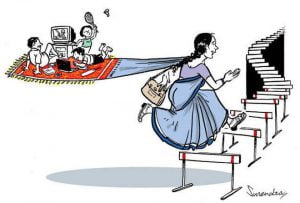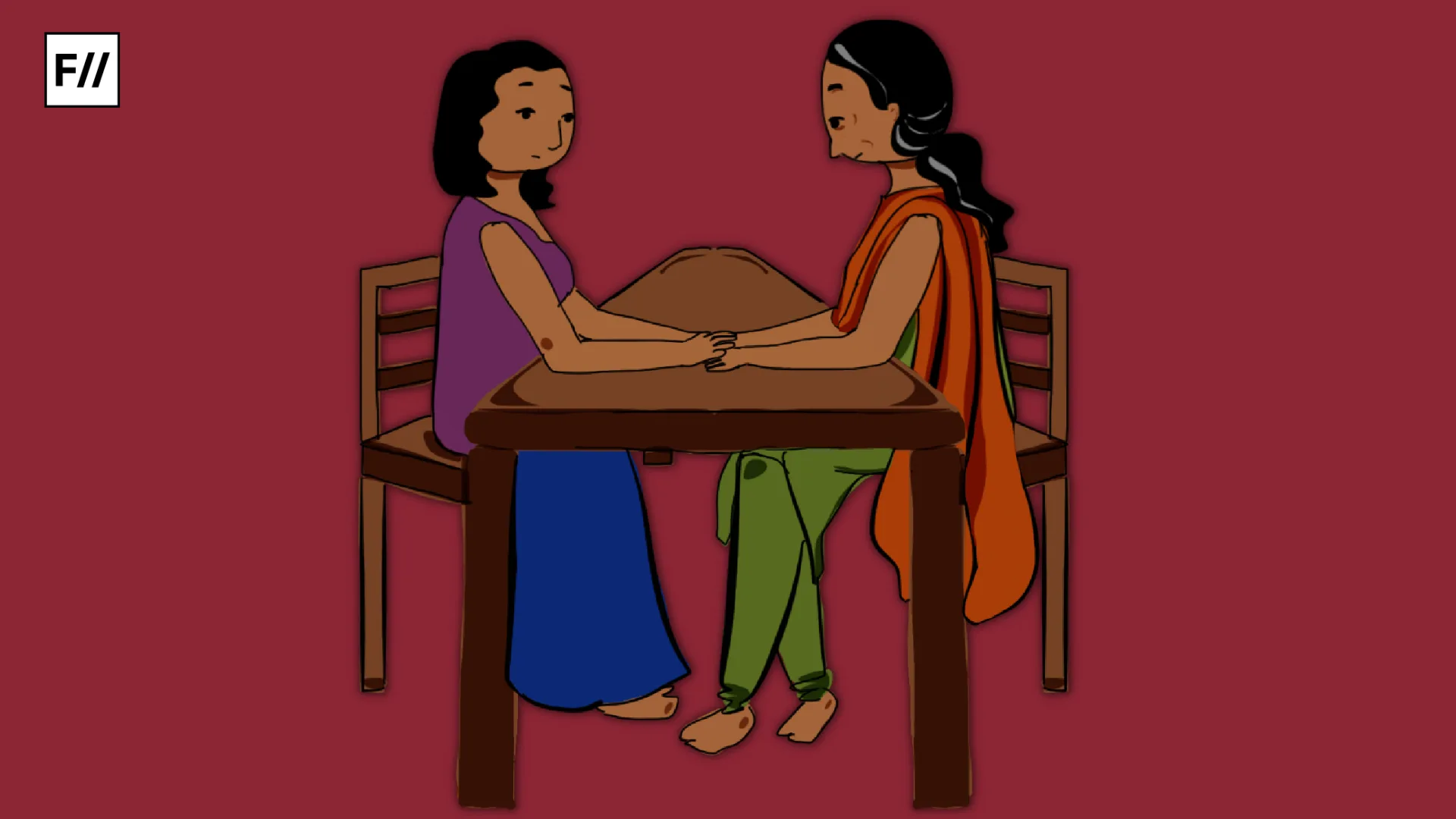A peek into most Indian families tells us that we are born and bred in the shackles of patriarchy. From who gets to voice out their opinion, to defined ‘gender roles’ accompanied with sanctions and violence against those who don’t submit, are all few ways in which the family ensures that everyone knows at all times, who the boss is. In such an environment, as parents who care for justice and equality often discuss and debate, what could raising feminist children look like while not ending up de-socializing them? Courtesy my endless conversations with fellow feminist parents and a deep dive into Chimamanda Ngozie Adichie’s book Dear Ijeawele or A Feminist Manifesto in Fifteen Suggestions, here are a few strategies:
1. Ditch The Stereotypes
Shopping for my daughter is usually a nightmare because any shop that I enter is overflowing with apparel for girls and is heavily ridden with pink/white coloured dresses and accessories, with slogans such as ‘Papa’s darling’, ‘Mom’s princess’, ‘Fashionista’ blah and for the same fabric and size, is more expensive than a boys grey/blue/black tee. Why’s that? Why the pink tax?

Image source: Girl Talk HQ
It is no rocket science that while mainstream Bollywood leaves no stone unturned to ensure that gender stereotypes maintain a firm grounding, the apparel industry is an offshoot of the same industry. Limiting the buyer’s choices and offering a king size choice within that limit, isn’t that a fooling strategy? They are all designed to imply that while girls need to look vivacious, bright, should focus on abundant clothing and keep themselves decorated, boys at the same time, can be content with the basics and focus on more important things in life such as play, outdoor work, or other skills.
2. Stop The Guilt, Working Mothers!
A great deal of how to raise feminist children is much about who the mother is – a catalyser of patriarchy or someone who resists it? One of the important things to consider is about how there has been an increasing debate on working vs stay-at-home mothers. Do we hear such debates on working vs stay-at-home fathers or abusive fathers vs helping fathers vs responsible fathers? No. Because of course, the entire dominant drama is always to get people who can possibly ally and resist to be divided and keep fighting for they own identity. And needless to say, the losers in this battle, either way are women.

Image source: The Hindu
From tips on spending ‘quality time 30 minutes a day’ to 101 suggestions on how mothers could balance work and family, such sexist topics are the ones written about somewhere or the other on a daily basis. The narrative seems to indicate three toxic notions:
a) Motherhood is the most important role you need to fulfil as a woman, and hence you need to consciously ‘make up’ for it inspite of everything else that you’re doing.
b) Mother-child relationship is a sacred relationship that is being compromised due to women’s choice to be out of the home.
c) Stay-at-home mothers don’t work and so they have all the time in the world to take care of their children.
Also read: 5 Most Annoyingly Intrusive Questions I Get Asked As A Mother
From my own standpoint, none of these is true and it is important that your children know it. They should see that as a woman you are engaged with what you do and you deserve respect for that, be it cooking in the kitchen or going to an office everyday or painting 10 hours a day!
3. Don’t ‘Ask’ Your Husband to Help!
See if any of the below are true for you:
a) Your child does not biologically or legally belong to your husband.
b) Your husband is a nanny who earns by taking care of your child.
c) Your husband is not well enough to take care of himself, let alone take care of anyone else.
If any of the above are true, you should probably seek your husband’s ‘help’ with household and child care. In all other cases, he should know it is his responsibility. It is important for children to know that while a mother gives birth, everything beyond it, except breast-feeding, is in the shared kitty of both the parents.
While a mother gives birth, everything beyond it except breast-feeding is in the shared kitty of both the parents.
While different parents adopt distinct strategies to get at this balance, it is also important to value the imperfection that comes with it. As a mother (just as a father) you may not ooze out love struck emotions when your child is incessantly crying as an alarm for your morning. It is alright! As a father, (just as a mother) the art of cooking tempting dishes for your child while they are hungry and cranky may not come naturally to you and that is alright too! To get impatient at each other’s lack of ‘parenting sense’ or ‘house-chores-smart sense’ is only going to lead us to fill the gap by overworking for the other person and creating an environment of inequality.
4. Stop Teaching Them To Be In The ‘Good Books’
Recently, I saw a mother going ga-ga about her 2-year old daughter’s new frock while she wore it and then five minutes later scolding her to ‘sit properly’ as her underwear was visible.

Image source: The Style Reactor
As parents, our entire effort while raising children up is to discipline them physically, socially and emotionally to be in the good books of others especially if they are girls. While boys are raised amongst notions of ‘Men will be men’ and ‘Boys look good when they are naughty’, girls are often told to sit, talk, and be in a certain way at home and school. Now connect the dots. What are we schooling them into doing? Are we not conditioning our boys to continue the way they are, if not accord more power to them whereas girls to be more submissive and not question or resist?
Raising feminists requires raising children who are valued for their questions, opinions, and resistance. Does that put your own power as a parent in jeopardy? It sure does! But did I ever say that raising feminists is a cakewalk? The only hack around this is probably to help children understand that their judgements and opinions must come from a well-informed, broad minded and a humane place.
Raising feminists requires raising children who are valued for their questions, opinions and resistance.
5. Tell Them that Women are Not to be Revered
On the face of it what seems to be the biggest irony in India is actually a well thought-out strategy to perpetuate power structures. The irony is that while women are subject to all sorts of violence at homes, on streets, and at work, they are also the ‘building blocks of society’. And if you’re a mother, God save you. But wait, God Can’t save you, because you are God! ‘Cow is mother and cow is God’, ‘India is our nation and India is our mother’. This

Image Source: Pinterest
larger than life image that is painted for women and mothers in particular is a potential threat to women’s freedom, choices, opinions, and power. Because it pushes you into giving in to circumstances and sacrificing yourself for others.
Girls at a very young age are expected to be silent when it comes to opinions, to give up their choices because she is a ‘good girl’. And when she shares her things or exhibits empathy or sympathy are highly appreciated while the same behaviour from boys can be interpreted as cowardice or weakness. We have all heard “Boys don’t cry” and “Ladkiyon ki tarah kyun sharma raha hai” (Why shy away like a girl?)
This larger than life image that is painted for women and mothers in particular is a potential threat to women’s freedom, choices, opinions, and power.
6. Tell Them That Gender Roles are Nonsense
In Adichie’s words:
“Gender roles are nonsense…If we truly depended on biology as the root of social norms, then children would be identified as their mother’s. We assume that the father is who the mother says the father is!”
In Indian families, especially those with grandparents, it becomes a bigger challenge to question gender roles and norms because we want to refrain from creating conflicts between children and their grandparents. It is however important to realise that a battle against patriarchy is impossible if we do not rope in all members of the family as this is the very basic unit through which patriarchy is exercised. While the friction with elders in the family can take ages to wither out, keep the conversation going with the children.
“Gender roles are nonsense…If we truly depended on biology as the root of social norms, then children would be identified as their mother’s.”
Let them know that all the resources and roles around us are for everyone irrespective of their gender be it toys or play time or food or anything else. And if anyone says “This is a boy thing” or “This is a girl thing”, they should sense it as a breeding ground for inequality.
7. Problematise Everyday Life
I love the word ‘problematise’. It doesn’t really mean that you create problems where they don’t exist but it rather to identify a problem with things that have always been presented to us in the most natural manner.
To problematise is to identify a problem with things that have always been presented to us in the most natural manner.
When my son was 5, he once talked about how his uncle would soon have a baby soon after getting married. His notion was a perfect starter for me to get him to understand how having kids need not be the most immediate step after marriage although it is common to see that around us. Gradually, it also became a ground to discuss issues as people who choose to stay single by choice, single mothers/fathers and then also move away from the very gendered categories – men and women.
Also read: Why Do We Not Acknowledge Mothers As People First?
Do kids always absorb the ideas the way we want them to? Absolutely not! It may not be the most critical information they want at that time and it may not matter to them as much as it matters to you at that given point. But these dialogues become building blocks for a lot of other learning they may wish to connect it to. All such little moments have in time made it easier for me to discuss about varying gender identities such as LGBTQIA+ people while he was 7, about menstruation when he was 8, and currently I am dealing with the most taboo-ed topic – Sex.
8. Attention: Raising Feminists Is Not About Having Parenting Strategies
By no means does this article intend to indicate that raising feminists or resisting patriarchy centres on parenting practices or behavioural modification that you or your child need to do. While family is a unit of patriarchy, it isn’t the only unit. The roots of our male dominated society are deeply entrenched in religion, traditions, politics, and even economy. Hence simply teaching children to accept their body image or keeping them away from porn or making them aware about concepts of sexuality or ‘disciplining them’ are only cheat strategies to divert attention from larger debates that must be seeded in young minds. Instead they need to realise that we are embedded in deep structures and societal institutions that help such inequality to prevail and that we need to question them more often than accept them at face value.
Featured Image Source: ABC




